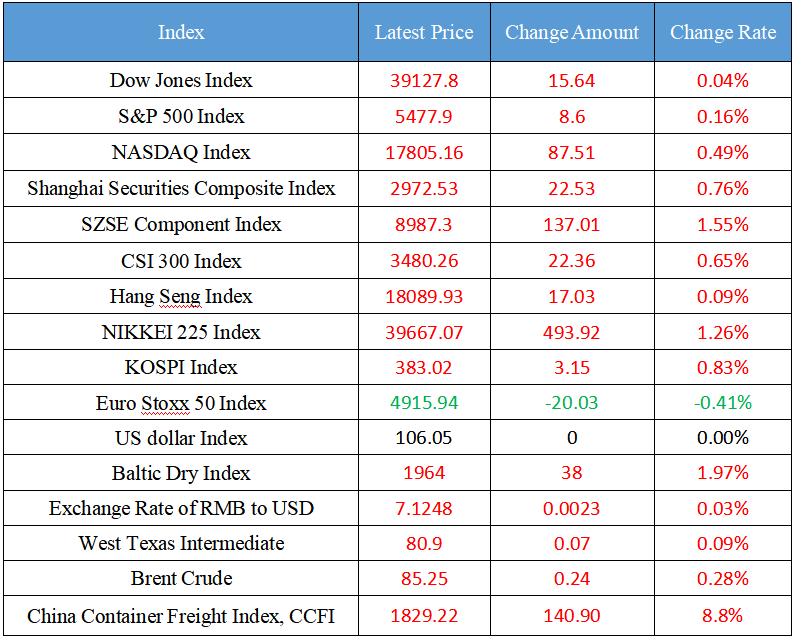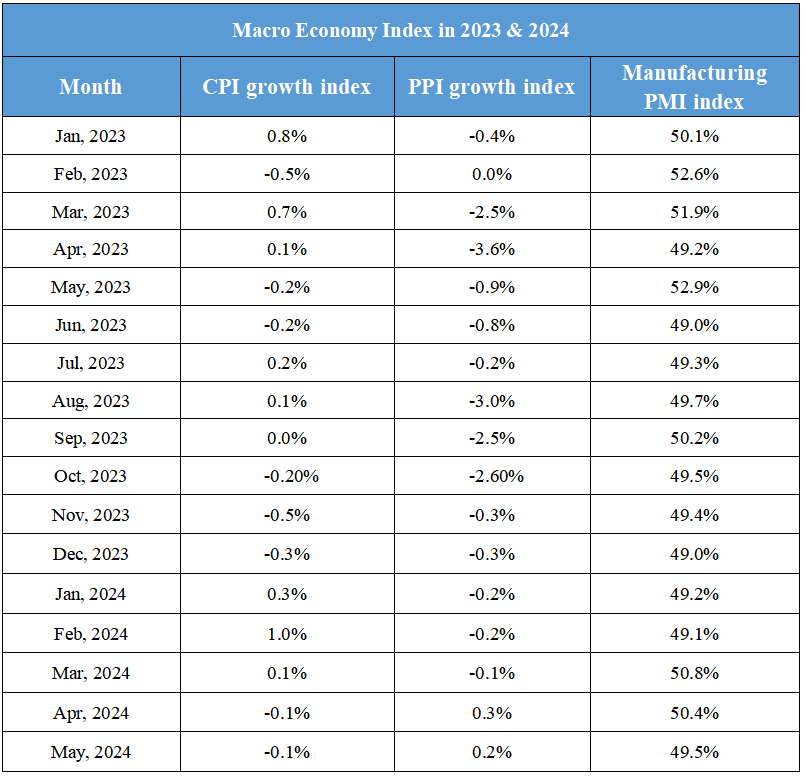On June 27th, Global Economic Highlights and Domestic Macro Trends
Latest Global Major Index
International Crude Price Trend and Exchange Rate of RMB to USD Trend

Domestic News
1. Vice Minister of the Ministry of Transport: From January to May this year, the volume of waterway freight reached 3.86 billion tons, an increase of 7% year-on-year
2. Wan Gang: The development of electric vehicles is unstoppable, and Chinese companies can invest in Europe and integrate into the local industrial chain
3. National Development and Reform Commission: Guide all kinds of capital to abandon the impetuous mentality of "quick success, fast access and out, and make quick money" and insist on long-term investment, strategic investment, value investment, and responsible investment
4. KPMG: China's economy is stable and improving
5. Guangdong is promoting hydrogen energy high-speed demonstration project
International News
1. Morgan Stanley: Central bank policy divergence provides room for the United States/Canada to rise sharply
2. France and Italy will compete for influential EU economic positions
3. German consumer confidence unexpectedly fell in July
4. The U.S. new home inventory hit a new high since 2008, threatening the construction industry
5. Voting in the national election for the Upper House of the new Thai parliament has ended
Domestic News
1. Vice Minister of the Ministry of Transport: From January to May this year, the volume of waterway freight reached 3.86 billion tons, an increase of 7% year-on-year
Fu Xuyin, Vice Minister of the Ministry of Transport, said at a press conference that in recent years, the volume of waterway freight has reached a new high. In 2023, the volume of waterway freight reached 9.37 billion tons, breaking the 9 billion ton mark for the first time. From January to May this year, the volume of waterway freight reached 3.86 billion tons, an increase of 7% year-on-year; The port's container throughput exceeded 130 million TEUs, a year-on-year increase of 8.8%. From the perspective of inland rivers, the Sanxia Locks and Changzhou Hub Locks on the Yangtze River and Xijiang Main Lines have passed a total of 170 million tons of cargo this year, an increase of 13.8% year-on-year. From January to May, the port's foreign trade cargo throughput reached 222,000 tons, an increase of 8.9% year-on-year.
2. Wan Gang: The development of electric vehicles is unstoppable, and Chinese companies can invest in Europe and integrate into the local industrial chain
At the 2024 World Economic Forum Annual Meeting of the New Champions - Summer Davos Forum, Wan Gang, chairman of the China Association for Science and Technology, said in response to the trade barriers set up by the European Union and the United States, that electric vehicles are the general trend of development, this trend is unstoppable, and we should firmly follow this path, and we should not slow down the pace of development because of some twists and turns in the process. Regarding the recent trade frictions in the electric vehicle market, Wan Gang said that new energy companies can start to try to invest in Europe. Through investment, Chinese enterprises have entered the local industrial chain and expanded the process of globalization. Wan Gang said that although there are some geopolitical influences at present, from the perspective of the government, the two sides should have good consultations on the road of global economic development.
3. National Development and Reform Commission: Guide all kinds of capital to abandon the impetuous mentality of "quick success, fast access and out, and make quick money" and insist on long-term investment, strategic investment, value investment, and responsible investment
Li Chunlin, Deputy Director of the National Development and Reform Commission, said that at present, China's financial scale system is already very large, but the financing structure needs to be improved. The cultivation of patient capital is crucial to promoting the high-quality development of China's venture capital and achieving high-level scientific and technological self-reliance. How should patient capital be cultivated and developed? In addition to fully respecting the laws of the market, the "visible hand" of the government can also play an important role in guiding all kinds of capital to abandon the impetuous mentality of "quick success, fast entry and quick exit, and make quick money", and insist on long-term investment, strategic investment, value investment, and responsible investment. In the next step, the National Development and Reform Commission will take multiple measures with relevant departments to enhance the ability of venture capital institutions to raise long-term and stable funds, and provide long-term and stable patient capital for the development of new quality productive forces and the service of the real economy. (China.com)
4. KPMG: China's economy is stable and improving
Speaking to reporters on the sidelines of the Dalian Summer Davos Forum, Li Yao, Head of KPMG's Global China Business Development Centre for China, said that international institutions have recently raised their forecasts for China's economic growth. This demonstrates the strong resilience and resilience of China's economy, and has been highly recognized by the international community for China's economic recovery. Although the external environment is complex and volatile, the fundamentals of China's steady economic recovery have not changed. She said that she is confident in the steady and positive growth trend of China's economy.
5. Guangdong is promoting hydrogen energy high-speed demonstration project
The Guangdong Provincial Development and Reform Commission issued the Implementation Plan for the Guangzhan Hydrogen Energy High-speed Demonstration Project in Guangdong Province, aiming to promote the large-scale commercial application of hydrogen fuel cell vehicles in Guangdong Province and create a demonstration benchmark for zero-carbon logistics. According to the Plan, the project will be implemented for 18 months from June 2024 to December 2025. The project covers Guangzhou, Foshan, Dongguan, Jiangmen, Yangjiang, Zhanjiang, Maoming and other places, relying on the transportation network of Shenhai Expressway and Shanzhan Expressway, to build a hydrogen energy cold chain logistics network, promote local hydrogen consumption, and explore sustainable development business models.
International News
1. Morgan Stanley: Central bank policy divergence provides room for the United States/Canada to rise sharply
Morgan Stanley expects USDCAD to see a sharp rise, especially in the safe-haven market. The bank believes that the USD/CAD exchange rate could benefit from the divergence in the policies of the Fed and the Bank of Canada, which may be less dovish than the Bank of Canada. Investors may not have fully digested this policy divergence yet, which provides room for USD/CAD to rise sharply, especially in a risk-off scenario where USD/CAD will break above the 1.40 mark.
2. France and Italy will compete for influential EU economic positions
According to the Financial Times, 27 EU leaders will gather in Brussels on Thursday to discuss appointments to the top positions in the EU's next commission. Ursula von der Leyen is expected to be re-elected President of the European Commission, former Portuguese Prime Minister Costa is expected to become the next President of the European Council, and Estonian Prime Minister Kallas is expected to be the next foreign affairs commissioner. In addition to the three top positions, France and Italy are expected to compete for the economic post of Commissioner for Trade, Competition and Industry, which has the power to control policies and fiscal levers to achieve industrial policy. Since Macron's rise to power, his relationship with Italian Prime Minister Meloni has been strained. Relations between the two countries have fallen to their lowest point in recent weeks. Personal grievances are expected to exacerbate this battle for economic jobs.
3. German consumer confidence unexpectedly fell in July
Consumer confidence fell slightly in July, ending a four-month upward streak, according to a survey on Wednesday that German households chose to sit on the sidelines due to uncertainty over rising prices and a slow economic recovery. The consumer confidence index, published jointly by GfK and the Nuremberg Institute for Market Decisions (NIM), unexpectedly fell to -21.8 from a slightly revised -21.0 in June, alongside other indicators that Germany has a bumpy road ahead. Rolf Buerkl, consumer analyst at NIM, said: "The recent disruption of the upward trend in consumer sentiment suggests that the road out of the consumption downturn will be difficult and there will always be setbacks. "Both income and economic expectations have declined slightly, while willingness to buy has stagnated at a low level and willingness to save has increased slightly, while willingness to save is already at a high level. "The slight rise in inflation in Germany in May, which clearly created more uncertainty for consumers, is reflected in the rise in willingness to save," Buerkl said. ”
4. The U.S. new home inventory hit a new high since 2008, threatening the construction industry
US new home inventory is at its highest level since the housing bubble burst more than a decade ago, raising the risk that builders will cut production as the market craves lower borrowing costs. The total number of single-family homes for sale rose to 481,000 in May, the highest level since 2008, according to the latest government data released on Wednesday. Nearly 100,000 of them have been completed and are still waiting for buyers, the most in 14 years. At the current rate of sales, it will take 9.3 months to deplete the entire inventory, the longest since 2022. With both the real estate industry and potential homebuyers anxiously awaiting lower borrowing costs, which will help increase affordability, the data poses a risk to the prospects of residential construction.
5. Voting in the national election for the Upper House of the new Thai parliament has ended
The final round of voting in the national election for the Upper House of Thailand's new parliament ended on June 26 local time. According to information released by Thailand's Central Election Commission, a total of 45,753 people applied for registration in the Upper House of parliament election, and after a county-level vote on June 9 and a provincial-level vote on June 16, 2,995 candidates were finally qualified to enter the final round of voting (national voting). They voted among themselves to elect 200 new members of the Upper House to replace the 250 members appointed after the 2014 military coup, whose term of office ended on May 10. Unlike the previous Upper House, which is made up of 200 MPs from 20 sectors, these new MPs no longer have the power to elect the Prime Minister, but will continue to be involved in legislation and constitutional amendments. In addition, they will be responsible for appointing independent bodies and overseeing the work of the government.
Domestic Macro Economy Index














